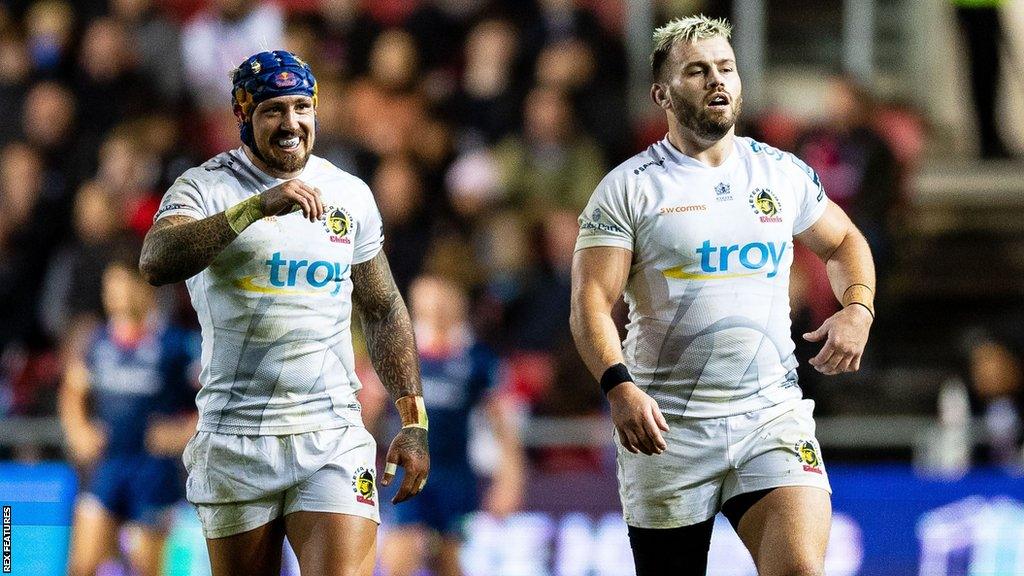Luke Cowan-Dickie: England & British and Irish Lions hooker to leave Exeter for Montpellier
- Published

Luke Cowan-Dickie made his Exeter debut aged 18 in 2011
England and British and Irish Lions hooker Luke Cowan-Dickie is to leave Exeter to join French side Montpellier at the end of the season.
He follows fellow Exeter forward Sam Simmonds in leaving the club for the French Top 14 side in 2023.
The Cornish-born 29-year-old has made 163 appearances for Exeter over 12 years and helped them win two English Premierships and one European title.
He will not move to France until after next autumn's World Cup.
It means Cowan-Dickie, who has won 42 England caps and played in all three Lions Tests against South Africa in 2021, will not be available to play for his country after the tournament.
"It's gutting to be leaving," he told the club website. "I've been at the Chiefs for 12 years and it's all I've known.
"That said, this opportunity came up and it was one that I had to think long and hard about. I spoke a lot with my family about it and it wasn't an easy decision to make in the end.
"Hopefully, I've still got plenty of years left in my career, but this is an opportunity for me to go over there and show what I am all about."
'I want to go out on a real high'

Cowan-Dickie and Jack Nowell (left) grew up playing alongside one another in west Cornwall and have gone on to play for Exeter, England and the British and Irish Lions
He is the latest big name player to leave Exeter as the reduced level salary cap of £5m continues to take effect.
Simmonds announced his departure earlier this season while last summer Lions lock Jonny Hill, homegrown Scotland forward Sam Skinner and winger Tom O'Flaherty all left.
There are still question marks over the future of England and Lions winger - and Cowan-Dickie's close friend - Jack Nowell along with long-serving back-row Dave Ewers, who are both out of contract in the summer.
"This is my club and I want to go out on a real high and win some trophies," added Cowan-Dickie.
"For me, this is the most important year of my Chiefs career because it's my last. The club, the people, the supporters, they've all done so much for me and I'm excited to get out there and put my best foot forward."
It also means an end to an international career that began by helping win a first-ever junior World Cup in 2013 as part of England's under-20 side.
He made his senior debut in a pre-World Cup game against France in 2015 and became a regular soon after the tournament, helping England win a 2016 Six Nations Grand Slam.

Cowan-Dickie is one of just three players to come through Exeter's academy ranks and go on to play for the British and Irish Lions
He scored tries in all three of England's pool games at the 2019 World Cup and came on as a replacement in the defeat by South Africa in the final.
Two years later he scored the Lions' only try as they beat South Africa in the first Test - also starting the second before coming on as a replacement in the final Test of the tour.
"Playing for England is the pinnacle of your career, so it's tough to leave that behind," he added.
"I still think I have lots more to give and, hopefully, I get more opportunities between now and the move.
"We've got the Six Nations coming up, then the World Cup, and I want to be involved in both.
"The only way I can do that, however, is by playing well at club level. That's my aim and we will see what happens in the future."
'Baxter must plan for new Chiefs generation'
Analysis - Brent Pilnick, BBC Sport
Luke Cowan-Dickie's decision to leave is not a surprising one - at the age of 29 he has fewer years ahead of him career-wise than behind.
While England's top clubs are constrained financially, the same is not the case across the Channel and Cowan-Dickie cannot be blamed for wanting to secure some stability for himself and his family in the final years of his career.
It begs the question of what happens now at Exeter as a crop of talented and influential homegrown players like Cowan-Dickie, Nowell, Sam and Joe Simmonds and Henry Slade all start to enter their late 20s and early 30s.
Exeter director of rugby Rob Baxter has always been aware that those homegrown players will one day end their time at Sandy Park, now he has to plan for a new generation to take their places.
With the likes of Dafydd Jenkins, Christ Tshiunza, Richard Capstick and Josh Hodge, there are exciting young players coming through, but it will be a difficult job to replace the talent that has already gone, is going, and that could yet still be lost.